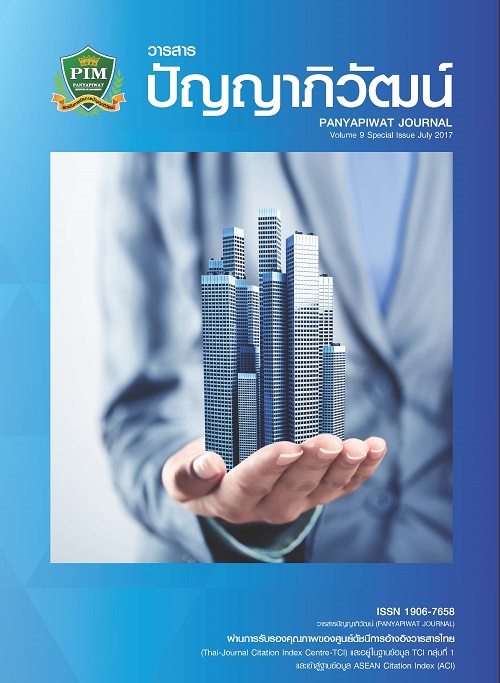การเปรียบเทียบตัวแบบการพัฒนาผู้ประกอบการระหว่างประเทศไทย กับหมู่เกาะ AZORES ประเทศโปรตุเกส
Main Article Content
บทคัดย่อ
งานวิจัยมีวัตถุประสงค์เพื่อเปรียบเทียบตัวแบบการพัฒนาผู้ประกอบการระหว่างประเทศไทยและหมู่เกาะ Azores ประเทศโปรตุเกส โดยใช้การวิเคราะห์ข้อมูลเชิงคุณภาพด้วยเทคนิคการวิเคราะห์เนื้อหา เก็บข้อมูลโดยการสัมภาษณ์ผู้บริหารองค์กรที่มีหน้าที่หลักในการพัฒนาผู้ประกอบการของประเทศไทย ได้แก่ กรมส่งเสริมอุตสาหกรรม กรมพัฒนาธุรกิจการค้า สถาบันพัฒนาวิสาหกิจขนาดกลางและขนาดย่อม สำนักงานส่งเสริมวิสาหกิจขนาดกลางและขนาดย่อม สถาบันการเงิน และสถาบันการศึกษา และใช้แบบสัมภาษณ์ผู้บริหารองค์กรที่มีหน้าที่หลักในการพัฒนาผู้ประกอบการของหมู่เกาะ Azores ประเทศโปรตุเกส ได้แก่ Society for the Business Development of the Azores, Azores Tourism Observation, Azores Chamber of Commerce และ University of the Azores การวิจัยนี้ดำเนินการตามกรอบตัวแบบในการพัฒนาผู้ประกอบการของ Dabson (2005) ทั้ง 5 ด้านคือ 1) การศึกษาด้านผู้ประกอบการของสถาบันการศึกษา 2) การฝึกอบรมและการให้ความช่วยเหลือด้านเทคนิค 3) การเข้าถึงเงินทุน 4) การเข้าถึงกลุ่มเครือข่าย และ 5) วัฒนธรรมการเป็นผู้ประกอบการ
ผลการวิจัยพบว่า ทั้งประเทศไทยและหมู่เกาะ Azores ประเทศโปรตุเกส มีการพัฒนาผู้ประกอบการเป็นไปในทิศทางเดียวกันระหว่างสถาบันการศึกษา กับการฝึกอบรมและการให้ความช่วยเหลือด้านเทคนิคแก่ผู้ประกอบการ โดยมีสถาบันการศึกษาเป็นหน่วยงานหลักในการสร้างองค์ความรู้เพิ่มเสริมสร้างผู้ประกอบการด้วยการสนับสนุนจากสถาบันวิจัยสนับสนุน สำหรับหมู่เกาะ Azores พบว่าการเข้าถึงเงินทุน ความเข้มแข็งและความเหนียวแน่นในการสร้างเครือข่ายผู้ประกอบการ ถือเป็นข้อได้เปรียบของหมู่เกาะ Azores เนื่องจากมีความเชื่อมโยงระหว่างภาครัฐ องค์กรต่างๆ สถาบันวิจัย หน่วยงานสนับสนุนด้านเทคโนโลยี สถาบันการศึกษาที่นำจุดแข็งและองค์ความรู้ที่มีช่วยในการพัฒนาศักยภาพผู้ประกอบการอย่างเป็นระบบ
สำหรับการพัฒนาผู้ประกอบการของประเทศไทยพบจุดแข็งในด้านการศึกษาด้านผู้ประกอบการในสถาบันการศึกษา การจัดการฝึกอบรมและให้ความช่วยเหลือในด้านต่างๆ แก่ผู้ประกอบการ และการช่วยเหลือด้านการเข้าถึงเงินทุนแก่ผู้ประกอบการ แต่ยังต้องมีการพัฒนาในด้านการสร้างเครือข่ายความร่วมมือการบริหารจัดการเครือข่ายที่ยังไม่เป็นระบบและยังไม่เข้มแข็ง และด้านการสร้างวัฒนธรรมการเป็นผู้ประกอบการให้เกิดขึ้น ดังนั้นรัฐบาลไทยจึงควรมีนโยบายที่มีความชัดเจนในการกำหนดเป้าหมายการดำเนินงานของเครือข่าย กระตุ้นให้เกิดกิจกรรมเชิงสร้างสรรค์และพัฒนาเพื่อรักษาความต่อเนื่องของเครือข่าย และมีวิธีประเมินประสิทธิผลให้เกิดการเรียนรู้และสร้างประสบการณ์ร่วมกันระหว่างองค์กร ทั้งหมดนี้เป็นการสร้างสภาพแวดล้อมของประเทศไทยให้เป็นสังคมแห่งการสร้างผู้ประกอบการอย่างแท้จริง
This research aimed to compare entrepreneurial development models between Thailand and Azores Islands, Portugal. It was a qualitative research using content analysis. The data was collected via interviewing people who were involved in organizations which took part in entrepreneurial development in Thailand and in Azores. In Thailand these people were representatives from the Department of Industrial Promotion, Department of Business Development, Small and Medium Enterprises Development Institute, Small and Medium Enterprises Promotion Agency, financial institutes, and academic institutions. In Azores, these were representatives from the Society for the Business Development of the Azores, Azores Tourism Observation, Azores Chamber of Commerce, and University of the Azores. The research questions were developed based on the concept of entrepreneurial development components of Dabson (2005) which comprised of 5 aspects, namely, Entrepreneurial education, Adult entrepreneurial training and technical assistance, Access to capital, Access to network, and Entrepreneurial culture.
The results showed that in Thailand and in Azores, the development approach in the aspects of entrepreneurial education and adult entrepreneurial training and technical assistance were in the same direction. That is academic institutions were the main resources in providing knowledge and creating entrepreneurs, as well as doing research to support entrepreneurship. In Azores, access to capital, access to network, and entrepreneurial culture were considered as advantages of Azores. There was a tight network among entrepreneurs, the government, business organizations, research institutes, agencies for the promotion of technology, and academic institutions, in order to utilize strength and knowledge from each organization in developing entrepreneurs’ potential.
As for entrepreneurial development model in Thailand, the analysis revealed that the advantage were entrepreneurial education, adult entrepreneurial training and technical and, access to capital. While networking and the management of the network was the disadvantage that was neither systematic nor strong and also the weak of entrepreneurial culture. Therefore, the Thai government should set up a clear policy of its network operation by promoting cooperation among diverse organizations. The Thai government should focus on coordination among these organizations as effective coordination is the heart of an efficient network, and also focus on the maintenance of that network. There should also be a way to assess the effectiveness of that network so that learning and experiences can be shared among the involved organizations. All of the above suggestions are to create the right environment for Thailand to become a true entrepreneurial development society.
Article Details
“ข้าพเจ้าและผู้เขียนร่วม (ถ้ามี) ขอรับรองว่า บทความที่เสนอมานี้ยังไม่เคยได้รับการตีพิมพ์และไม่ได้อยู่ระหว่างกระบวนการพิจารณาลงตีพิมพ์ในวารสารหรือแหล่งเผยแพร่อื่นใด ข้าพเจ้าและผู้เขียนร่วมยอมรับหลักเกณฑ์การพิจารณาต้นฉบับ ทั้งยินยอมให้กองบรรณาธิการมีสิทธิ์พิจารณาและตรวจแก้ต้นฉบับได้ตามที่เห็นสมควร พร้อมนี้ขอมอบลิขสิทธิ์บทความที่ได้รับการตีพิมพ์ให้แก่สถาบันการจัดการปัญญาภิวัฒน์หากมีการฟ้องร้องเรื่องการละเมิดลิขสิทธิ์เกี่ยวกับภาพ กราฟ ข้อความส่วนใดส่วนหนึ่งและ/หรือข้อคิดเห็นที่ปรากฏในบทความข้าพเจ้าและผู้เขียนร่วมยินยอมรับผิดชอบแต่เพียงฝ่ายเดียว”
References
Azoresweb. (2014). About the Azores. Retrieved July 2, 2014, from www.azoresweb.com/economy.html
Baron, R. & Shane, S. (2005). Entrepreneurship a process perspective. South-Western: Thomson Corporation.
Bessant, J. & Tidd, J. (2011). Innovation and entrepreneurship. Italy: Printer Trento.
Dabson, B. (2005). Fostering Entrepreneurship Development Systems in Rural America: First Review of the Request of Proposals. Retrieved July 8, 2014, from https://www.researchgate.net/publication/237350075_FOSTERING_ENTREPRENEURSHIP_DEVELOPMENT_SYSTEMS_IN_RURAL_ AMERICA
Department of Industrial Promotion. (2014). Main Industrial Project. Retrieved July 2, 2014, from http://info.dip.go.th/โครงการกสอ/โครงการกสอ2557/tabid/355/Default.aspx [in Thai]
Department of Industrial Promotion. (2014). Presentation document about capacity building for entrepreneur. [Unpublished].Bangkok: Department of Industrial Promotion. [in Thai]
Kim, Y., Yoon, S. & Kim, H. (2014). An economic perspective and policy implication for social enterprise. American Journal of Applied Science, 11(3), 406-413.
Mckeon, T. K. (2013). A college’s role in developing and supporting and entrepreneurial ecosystem. Journal of Higher Education Outreach & Engagement, 17(3), 85-89.
Pitelis, C. (2012). Clusters, entrepreneurial ecosystem co-creation, and appropriability: a conceptual framework. Industrial and Corporate Change, 21(6), 1359-1388.
Towards a ris3 for the Azores. (2012). Retrieved July 8, 2014, from https://www.fct.pt/esp_inteligente/docs/Workshop_11122012_JoseAzevedo.pdf
Vicens, L. & Grullon, S. (2011). Innovation and entrepreneurship: a model based on entrepreneur development. International-American Development Bank. Discussion Paper, No. IDB-DP-202.
Wiset, N. (2017). Factors Influencing Business Operations of Small and Medium Enterprise Entrepreneurs in Nonthaburi Province. Panyapiwat Journal, 9(1), 13-24. [in Thai]

